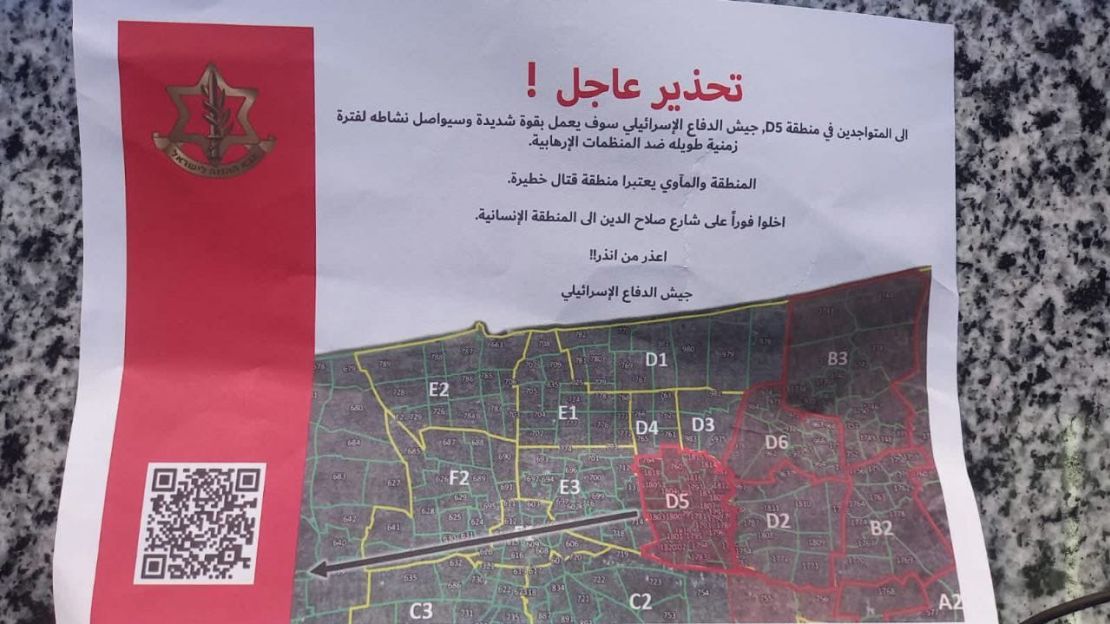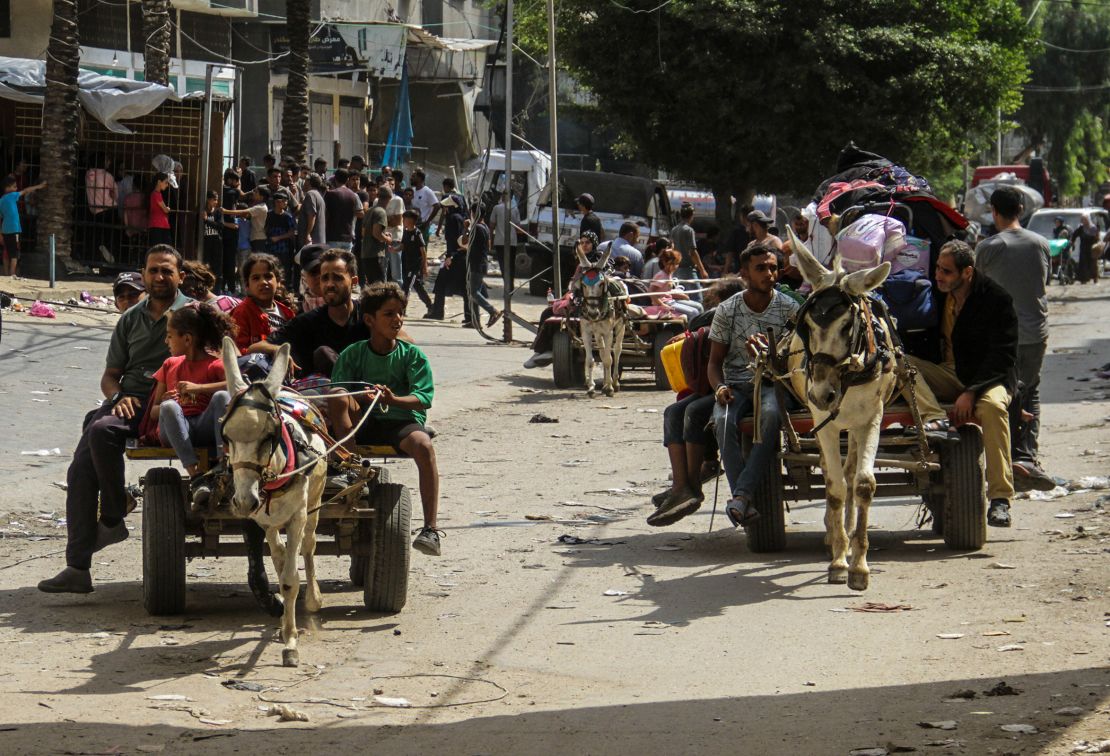The Israeli military is carrying out a widespread operation in northern Gaza, issuing evacuation orders and blocking food supplies, just weeks after Prime Minister Benjamin Netanyahu was reported to be mulling a plan to besiege the area to starve Hamas and force it to release hostages.
The Israel Defense Forces (IDF) this week launched the operation following intelligence that it said showed “the presence of terrorists and terror infrastructure in the area of Jabalya in the northern Gaza Strip, as well as efforts by Hamas to rebuild its operational capabilities in the area.” In practice, the renewed offensive has been far more widespread than the Jabalya refugee camp.
Four sources have told CNN that the Israeli cabinet has not adopted the siege proposal put forward by retired general Giora Eiland. But the operation currently underway bears resemblance to the plan presented by Eiland in a public video, and in private to the Israeli cabinet and the Knesset, Israel’s parliament.
A former senior military official who is aware of the Israeli government and security leadership’s thinking – though not directly involved in decision-making – told CNN that the cabinet had adopted “a version of” Eiland’s proposal, which has come to be known as “The General’s Plan.” Eiland told CNN the claim was “quite true” but said there were significant differences between his proposal and what was being implemented on the ground.
The operation comes at a time when the Israeli government is known to be considering several plans to reset the war in Gaza.
Eiland last month proposed forcing all civilians out of northern Gaza, including Gaza City, and then cutting off all supplies to the area. The goal, he said, was to force a reset in the war and upend Hamas leader Yahya Sinwar’s calculus. “The reality today in Gaza is that Sinwar is really not stressed,” he said in a video released at the time.
The former military official who spoke to CNN said that “what was adopted [by the government] was the need to do more in Gaza, to change the way Sinwar is thinking. It was adopted without any way that may be conceived a violation of international law.”
Eiland’s proposal had no plan to allow Gazan civilians to return to northern Gaza, Retired Major-General Gershon Hacohen, who was involved in its drafting, told CNN. That situation would seem certain to draw accusations of ethnic cleansing, something that has already been raised by academics like Omer Bartov, an Israeli-born professor of Holocaust and genocide studies at Brown University in Rhode Island.

Eiland told CNN by text message that the cabinet is “indeed acting on my recommendation with the intention of taking control of the northern Gaza Strip, but I recommended implementing a siege (after evacuating the civilians) and stopping the entry of supplies into this area. None of this is happening.”
On Monday, the Israeli military’s Arabic-language spokesperson ordered all Palestinians in Gaza’s northern-most communities – Beit Hanoun, Jabalya, and Beit Lahia – to leave and relocate to Al Mawasi, an Israel-declared “humanitarian area” in southern Gaza that has nonetheless come under intense aerial bombardment for months.
The military on Saturday added additional mandatory evacuation zones, dropping flyers and posting on X, ordering people in the Nazla area and more areas of Jabalya to leave.
The military “is operating with great force against terrorist organizations and will continue to do so for an extended period,” Avichay Adraee said on X. “You must evacuate the area immediately via Salah al-Din Street to the humanitarian zone.”
Most intense action
Supplies of food into northern Gaza, already meager, appear to have almost entirely stopped since the Israeli military began its renewed operation there this week. The World Food Programme told CNN on Friday that no food trucks had entered northern Gaza since the start of the month.
“Virtually the entire area is under evacuation orders, and thousands of families have been forced to flee amid intense airstrikes and military operations on the ground,” WFP said in a statement on Wednesday. “With the main aid crossings into northern Gaza closed and WFP-partner kitchens forced to shut down, WFP is no longer able to distribute food in any form to families that desperately need it.”
CNN asked the IDF for comment on aid deliveries being blocked.
Netanyahu told a closed-door Knesset committee last month that the Generals’ Plan “makes a lot of sense,” according to national broadcaster Kan, a CNN affiliate. He said that it was one of several ideas being considered to change the course of the war in Gaza, which is now in its second year.
Palestinians in northern Gaza say that this week has brought some of the most intense military action of the war. Many, wary of repeated orders over the past year to move to areas of Gaza that then themselves come under attack, are ignoring the order. “Anyone who wants to leave the north to Gaza wants death,” Jabalya resident Mohammad Ibrahim told CNN by phone this week.
Palestinians fleeing the renewed operation have been shot at as they evacuate, according to residents there and footage shared with CNN documenting their journey. CNN has reached out to the IDF for comment.

“Even the basic necessities of life for the besieged people are unavailable,” Ibrahim said. “There is no safe drinking water, no adequate or healthy food, no medicine, no treatment, and no hospitals. They are working at minimum capacity and are exhausted. Even the safe places are bombed with shells and rockets.”
Dr. Hussam Abu Saifiya, director of the Kamal Adwan Hospital in northern Gaza, said the facility was informed by the Israel Defense Forces (IDF) Tuesday that medical staff and patients must evacuate the hospital “within 24 hours.” They were not told where to go, he said. Al Awda and the Indonesian hospitals have also been ordered to leave, according to local officials. Hospital officials say Israel’s intense bombardment of the area makes it impossible to leave safely.
Meanwhile, seven attempts this week by the World Health Organization to reach northern Gaza were “denied or impeded,” Director-General Dr. Tedros Adhanom Ghebreyesus said Thursday.
“The team was unable to carry out the medical evacuation of critical patients from Kamal Adwan, Al-Awda and Indonesian hospitals to Al-Ahli and Al-Shifa, due to delays of over 10 hours at checkpoints,” he said in a statement on X.
CNN’s Eugenia Yosef, Abeer Salman and Eyad Kourdi contributed to this report.





